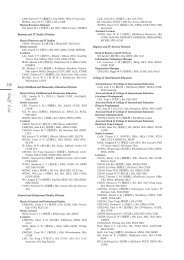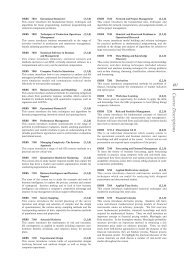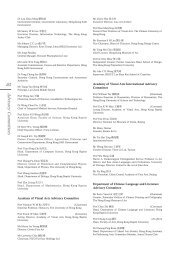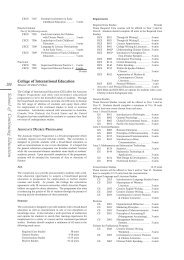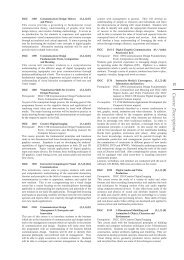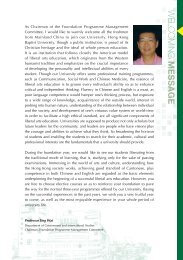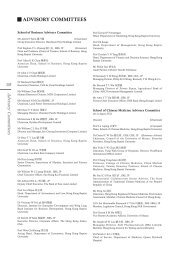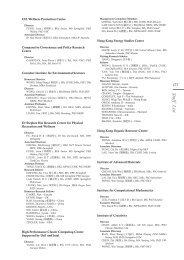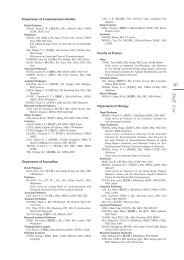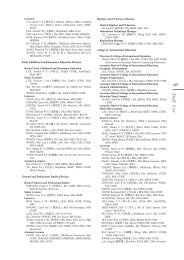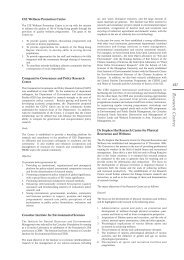326<strong>Course</strong> <strong>Descriptions</strong>of self—students will learn their basic urges. They will betterunderstand themselves, others and their environment.ENG 3990 Special Topic in Western Critical (3,3,0) (E)TheoryPrerequisite: ENG 2830 Western Critical Approaches toLiteratureThe aim of this course is to provide a rigorous study of a specific,influential area of modern literary theory. The analytical skills ofthe advanced student of literature will be sharpened further by anengagement with basic questions about literary practice througha particular theoretical perspective. The content of the coursemight vary from time to time, with the focus either upon a specifictheory (e.g. Psychoanalysis, Post-colonial Theory, or Feminism)or upon a particular writer in the English language, who has had adecisive influence in the development of critical theory.ENG 4710 Advanced Topic in Comparative (3,3,0)LiteraturePrerequisite: Two Level III courses from the Stylistics andComparative Literature ConcentrationThe selected topic will be determined by the individual instructor.The course will focus on interdisciplinary and cross-culturalconcerns relevant to the study of comparative literature.ENG 4720 Advanced Topic in Literatures (3,3,0)in EnglishPrerequisite: ENG 2830 Western Critical Approaches toLiterature, ENG 3850 Special Topic in Literatureor ENG 3990 Special Topic in Western CriticalTheoryThis course will define critical and disciplinary parametersnecessary to in-depth study and research of literature(s) writtenin English. Students will be introduced to methodologies orapproaches relevant to the study of the selected topic. Illustrationof the topic will be done through close readings of selectedprimary and theoretical texts.ENG 4730 Advanced Topic in Linguistics (3,3,0)Prerequisite: Two Level III courses from the Language in DepthConcentrationThis course will introduce students to a specialty or issue inlinguistics. The selected topic will focus on either a branchof linguistics (e.g. Discourse Studies, Language Acquisition,Sociolinguistics) or an issue (e.g. Contrastive Grammar of Chineseand English, Gendered Discourse). Regardless of the specialtyor issue selected, students will be encouraged to be critical ofalternative approaches, and to analyse authentic data usingdifferent theoretical frameworks.ENG 4740 Advanced Topic in Language (3,3,0)StudiesPrerequisite: Any course(s) which the lecturer may designateThis course allows students to study a selected theme or issue inlanguage studies at an advanced level. Students will examine thestrengths and weakness of different paradigms in studying thechosen topic and evaluate the various methodologies in handlingthe topic based on their advanced knowledge of the concepts andprinciples pertaining to the chosen theme or issue.ENG 7010 Required Readings for Translation (3,0,0)StudiesThe supervisor and the student will be required to work outa reading list to cover the areas of translation pertaining tothe student’s research area. The list will be submitted to thedepartment for record.ENG 7020 Required Readings for Comparative (3,0,3)Literature StudiesThe supervisor and the student will be required to work out areading list to cover the areas of comparative literature pertainingto the student’s research area. The list will be submitted to thedepartment for record.ENG 7030 Required Readings for Literature (3,0,3)StudiesThe supervisor and the student will be required to work outa reading list to cover the areas of literature pertaining tothe student’s research area. The list will be submitted to thedepartment for record.ENG 7040 Required Readings for Language (3,0,3)StudiesThe supervisor and the student will be required to work out areading list to cover the areas of comparative linguistics pertainingto the student’s research area. The list will be submitted to thedepartment for record.ENG 7210 English Grammar and Meaning (3,3,0)This course deals with the grammatical system, the lexical systemand the semantic system of English.ENG 7220 Sounds and Words in English (3,3,0)This course focuses on morphological structures and phonologicalstructures of English words, phrases and sentences.ENG 7230 Language, Culture and Society (3,3,0)This course examines relationships between social organizationand language use and deals with relationships at both micro- andmacro-levels of analysis with interdisciplinary bases in sociology,anthropology, ethnography of communication, and linguistics.ENG 7240 Narrative Art (3,3,0)This course introduces students to different genres of literatureand children’s literature. It develops students’ ability to appreciatevarious language arts in English, including fiction and non-fiction,poetry and verse speaking, plays and dramatic activities, the massmedia, movies, hypertexts and hypermedia.ENG 7250 Discourse Analysis (3,3,0)This course introduces students to a range of resources andtechniques for analysing texts and dialogues, including registeranalysis, functional analysis of clauses and sentences, as well asanalysis of text cohesion and generic structure.ENG 7260 Language Acquisition and Language (3,3,0)LearningThis course studies both first and second language acquisition.Factors affecting language learning such as cognitive development,age, gender, individual differences and theoretical issues in secondlanguage acquisition will be examined with special reference tobilingual education in <strong>Hong</strong> <strong>Kong</strong>.ENG 7310 Literary Theory (3,3,0)This course explores several topics in the history of literarycriticism and critical theory. These include, among others,interpretation; canon formation; ideology; class, race, gender, andsexuality; discourse; hegemony; signification; and performativity.We will read key texts from every period in the Western canon,concluding with New Historicism and trauma theory.ENG 7320 Global Modernisms (3,3,0)In acknowledgement of the broad plurality of modern experience,and of the literatures in English depicting it, the course willexplore the broad canon of modern literature as constructedcomparatively across diverse linguistic, cultural and nationalcontexts. The course will search for a broader rendering of“Modernist” culture, embracing old and new and ranging acrossthe arts and media.ENG 7330 Graduate Research Seminar (3,3,0)This course is designed to engage students in critical discussionsabout aspects of literature from a world perspective. Studentswill examine major issues and concepts pertaining to the studyof world literature and/or comparative literature with referenceto selected literary texts. The relationship between literatureand culture will be emphasized and different perspectives will be
adopted for reading and interpreting world literature. Specifictopics may vary from year to year.ENG 7340 World Literatures in Modern Times (3,3,0)This course seeks to understand world literature not as a collectionof national literatures created in different linguistic and culturallocations, but as instances of human imagination firmly secured inand actively engaged with the processes of the world. Reading aselection of texts, fictional and critical, we will discuss the conceptand practice of world literature—its genealogy and vision, aswell as its idealism, politics, and limitations—in close relation tohistorical forms and forces of globalization. Themes followed inthis course may include: worldliness, philology, national literatureand cultural imperialism, canonization and institutionalization,translation and its limits, world literature and global modernity,the futures of humanism.ENG 7350 Comparative Literature and Arts (3,3,0)This course compares and analyses different national literaturesand their non-literary counterparts. Emphasis will be placed onwidening students’ literary horizon, examining the similaritiesand differences among cultures, analysing the aesthetic exchangebetween literature, media, and nonfiction in a global context,and helping students develop their moral and ethical positions inresponse to different cultural, political, religious traditions.ENG 7360 The Ecocritical Imagination (3,3,0)The course will examine the variety of texts and genres, literaryand critical, that document the relationship between the livingworld and its physical environment—focussing on the urgentecological relationship between sentient creatures and the nonsentientsubstrate. What are the global implications for theliving world, and how has the awareness of potential and actualproblems found reflection in the literatures of environmentalconsciousness?ENG 7370 World Theatre (3,3,0)This course provides a platform for students to examine thehistory of world drama, and the influence of dramatic movementsacross cultural contexts. Topics of interest may include the studyof genres, dramatic schools, theories, movements, and specificplaywrights. Equal emphasis will be given to various theoreticalpursuits, as we analyse plays in light of gender theories, ideology,historicism, and performance studies.ENG 7380 Twenty-first Century Fiction (3,3,0)Twenty-first century fiction provides a forum from which toexplore recent novels from around the world. Topics that maybe investigated include the transnational, the post-postcolonial,the late-postmodern, the spectacular, the performative, hybridity,immigration, mass culture, sexuality, reliability, disaster, andprotest. Given the global context of the course, English-languagetexts are selected from countries as diverse as Canada, India,Ireland, the USA and broader regions like the Caribbean andAsia. Particular emphasis will be placed on the political, cultural,and global underpinnings of the texts under consideration,drawn from this still-young century. Students will be encouragedto juxtapose the contents and contexts of chosen works whilecharting apparent shifts and trends in early 21st century artisticrepresentation.ENG 7390 Advanced Topic in Literary and (3,3,0)Comparative StudiesThis course will define critical and disciplinary parametersnecessary to in-depth study and research of literature(s) writtenin English. Students will be introduced to methodologies orapproaches relevant to the study of the selected topic. Illustrationof the topic will be done through close readings of selectedprimary and theoretical texts.ENG 7400 Advanced Topic in Genre Studies (3,3,0)This course will examine the features and/or development of agenre or subgenre, up to the present time. In a particular year,the focus of the course may be on a specific period and/or a (sub)genre, rather than a broad survey. Aside from a solid theoreticalcomponent, the course will offer a focus on selected texts with aview to developing the analytical and critical tools necessary tounfold their artistry and meaning.ENG 7410 Advanced Topic in Critical Theory: (3,3,0)Popular Cultural StudiesThis course will focus on the interdisciplinary, and still-emerging,field of cultural studies. Moving through the evolution of thecritical discipline, which integrates its Marxist inceptions in1950s Britain, its post-colonial and post-structuralist inclinationson the Continent in the 70s and 80s, and its contemporarymultidimensional applications in places as different as the USand <strong>Hong</strong> <strong>Kong</strong>, this course will utilize the various discourses ofculture and pop culture (including theory, the novel, and film) toexcavate topics like stardom, the chic, the bourgeois, urbanism,democracy, globalism, reality television, mass identity, anderoticism. Students will be encouraged to develop their owninformed ways of reading “culture” in its numerous modalities.ENG 7420 Master’s Project (3,3,0)The project is an elective course during the second semesterdesigned for students who have (a) achieved a satisfactory (passing)grade in the Graduate Research Seminar and (b) submitted asatisfactory prospectus to the Programme Planning Team (PPT)no later than the end of March of their final (or only) year ofstudy. Although supervised by a member of staff, students willbe encouraged to achieve a high level of self-directed explorationin their research and writing. The Project enables students todevelop their own thinking and scholarship in an area relevant tothe broad ambit of the degree. The project will demand rigorousstandards of research and writing and, aside from its intrinsicvalue as a piece of scholarship, will provide valuable evidence(initially, in the form of an article-length research paper output) ofa given student’s worthiness for academic appointments or furtherstudies.ENG 7430 The Erotics of Humanism (3,3,0)Taking its departure from the Western cultural project of historicalhumanism, this seminar will ask questions about the eroticand affective developments that occur within the processes ofhumanism’s emergence as the cultural dominant within domainsof knowledge production, creativity and species formation. Thesequestions presume that the erotic is both a necessary component inthe development of humanism—one of its necessary conditions—and also one of the consequences of that emergence. Readingswill move from Plato to Foucault and shall include creative,critical and theoretical works.ENG 7440 The Postcolonial and India (3,3,0)This course considers “India” as a site of literary productionwithin colonial and postcolonial discourse before and after Indianindependence in 1947. A privileged site in diasporic Anglophonehistory, India was among the earliest nations to delink its historyof English from colonial culture. As both material locus ofpostcolonial reality, and an imaginary site in language, “India”both constitutes and problematizes contexts of race, class andnation and the canons deriving from these.Note: The prerequisites for the English courses marked with an asterisk (*)can be waived with the consent of the Head of the Department. Allprerequisites, unless otherwise stated, apply to English majors only.ENGL 1005 English, Creativity, and Cultures (3,3,0) (E)This course will (1) examine the changing nature of language, andhow creativity forms and transforms the English language anddifferent cultures in English; (2) question and challenge students’perceptions of language, culture and creativity; (3) reflect onhow creativity has played a role in the production of literary andeveryday texts; and (4) lay a foundation for linguistic and literarystudies.327<strong>Course</strong> <strong>Descriptions</strong>
- Page 3 and 4: economic growth, trade, pollution,
- Page 5 and 6: specific empirical economic problem
- Page 7 and 8: of private enterprises in the indus
- Page 9 and 10: period. The first part of the cours
- Page 11 and 12: The reactions and effectiveness of
- Page 14: 314Course DescriptionsEDUC 3080 Tea
- Page 17 and 18: development of children and adolesc
- Page 19 and 20: and communication skills in differe
- Page 21 and 22: y ubiquitous technology. Learners w
- Page 23 and 24: ENG 2650 Topics in English Grammar
- Page 25: clause structures of the English la
- Page 29 and 30: drama; and (2) introduce Western dr
- Page 31 and 32: ENGL 4005 Advanced Topic in Compara
- Page 33 and 34: attendant to the break-up of mediev
- Page 35 and 36: EURO 3205 Comparative Politics of (
- Page 37 and 38: states, enlargement provides signif
- Page 39 and 40: to create and develop ideas via rel
- Page 41 and 42: strategies of awarded campaigns to
- Page 43 and 44: characteristics of films, film-make
- Page 46: 346Course DescriptionsFINE 1005 Fin
- Page 49 and 50: GCHC 1005 China and the Global Econ
- Page 51 and 52: the period with a special focus on
- Page 53 and 54: est decision-making procedures. Mor
- Page 55 and 56: GCPE 1065 Table Tennis (1,2,0) (C)T
- Page 57 and 58: and/or philosophical traditions the
- Page 59 and 60: on the use of English in various se
- Page 61 and 62: GDAR 1835 Music, Mind, and Human (3
- Page 63 and 64: lead to successful development of n
- Page 65 and 66: management and proactive stakeholde
- Page 67 and 68: GDCV 1065 Buildings of Hong Kong: (
- Page 69 and 70: of various religions that broaden t
- Page 71 and 72: their implications for contemporary
- Page 73 and 74: gone through since 1945 included th
- Page 75 and 76: GEOG 1005 Geography and the Contemp
- Page 77 and 78:
students to the concepts and techni
- Page 79 and 80:
GEOG 3730 Energy Policy and Analysi
- Page 81 and 82:
processes interact with China’s s
- Page 83 and 84:
GERM 1006 German II (3,3,0) (G)Prer



